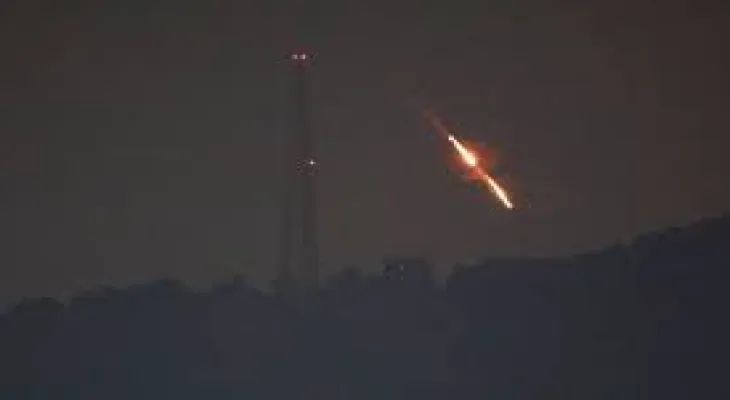Search here
Newspaper
Search here

Arab Canada News
News

Published: April 16, 2024
After the Iranian missile strikes and drones against Israel over the weekend, Canada must take the Iranian threat and the potential escalation of the conflict seriously, says a global affairs analyst.
Ariel Brown, a professor of international relations and political science at the University of Toronto, said in a video interview with CTVNews.ca: "We have a larger global interest," adding, "Iran poses a threat not only to Israel but to Arab countries (and) the broader international order."
Brown, who is also a fellow at the Davis Center for Russian and Eurasian Studies at Harvard University, stated that Iran, closely allied with Russian President Vladimir Putin, has supplied Russia with thousands of "killer drones" that have killed thousands of civilians and soldiers.
He added, "So Iran's claws extend over a very large area, and we in Canada, as a member of the G7, as a member of NATO, as a supporter of Ukraine, and as a democratic state, have an important interest in this matter."
"If (Iran) is able to control the region, it has global ambitions, and if it has nuclear weapons, it will pose a threat because that would provide it with new capabilities."
Despite the antagonistic relations since Iran's Islamic Revolution in 1979, Iran launched a direct military attack on Israel only on Saturday, according to the Associated Press. Israel stated that 99 percent of nearly 300 drones and missiles were intercepted, which occurred following a suspected Israeli raid in Syria on April 1. Israel has not confirmed responsibility for this attack, which resulted in the deaths of two Iranian generals in an Iranian consulate building.
Iran announced the end of the operation and there were no reports of casualties in the Saturday attacks.
The situation is very volatile
Ido Moed, Israel's ambassador to Canada, described the situation as "very volatile," stating during a question period broadcast by CTV on Sunday that Israel needs to act to ensure that Iran "does not harm us further."
He added that Israel needs support from allies like Canada.
James Horncastle, Edward McWhinney Professor of International Relations at Simon Fraser University in Burnaby, British Columbia, stated that it is difficult to predict Canada's role since it depends on whether the conflict escalates or not.
Horncastle said in a video interview with CTVNews.ca: "Canada has been very clear since the beginning on Saturday that the goal is to try to prevent escalation of the conflict." "There is a lot of internal pressure within Israel trying to impose some sort of reaction. ... Ultimately, it is too early to say one way or the other."
Among the actions Canada may take is declaring the Iranian Revolutionary Guard Corps, a branch of Iran's military, a terrorist organization, although he stated that this would be "symbolic at best."
Horncastle believes that the Iranian attack on Saturday was partly aimed at maintaining support for the regime from anti-Israel and U.S. proxies they support in the region.
He added, "The Iranian attack was primarily designed to be very loud, but the way they managed it, and the way it was so public, gave a significant early warning to Israel and the U.S. that an attack was coming, and actually increased the chances of it," noting that the attack succeeded at the very least.
He emphasized that "the way they responded was essentially aimed at giving Israel and the U.S. a chance not to escalate actions further."
Brown stated that Israel's allies should resort to non-military means in dealing with Iran, such as sanctions, supporting dissidents, and resuming the sale of more weapons to Israel. Canada has not approved new permits to export weapons to Israel since January 8, stating that Ottawa must ensure that weapons are used in accordance with Canadian law, according to Reuters.
He added that the step to freeze arms exports to Israel sends a "wrong message."
He stated, "Essentially, we are punishing a country for resisting aggression... that began on October 7." "So we sent the wrong signal. It encourages terrorism, it encourages terrorist regimes."
One of Iran's goals is to eliminate Israel, but Brown said that military conflict should be avoided as much as possible. He added, "If we want to avoid deploying ground troops in the Middle East, the best way is to support Israel and support Arab countries like Saudi Arabia and other nations that want to defend themselves against Iran."
Canada's response
From the UK to France, world leaders are urging Israel not to retaliate after Iran launched hundreds of drones and ballistic missiles and cruise missiles against Israel on Saturday.
When asked by CTVNews.ca about what Canada was doing in response to the recent flare-up of tensions between Israel and Iran, Canadian Global Affairs spokesperson Pierre Goguet referred to Canada’s joint statement with G7 leaders. Canada and other G7 leaders unequivocally condemned the "unprecedented direct Iranian attack" against Israel in a statement issued on Sunday.
The statement read: "We express our full solidarity and support for Israel and its people, and reaffirm our commitment to its security."
Canada stated that it will continue to work towards "stabilizing the situation and avoiding further escalation."
It wrote: "Through its actions, Iran has moved toward destabilizing the region and risks provoking an uncontrollable regional escalation," noting that it is ready to take steps to help avoid further escalation of the situation.
Prime Minister Justin Trudeau stated on Saturday that Canada is in contact with its allies and is closely monitoring the situation.
Comments